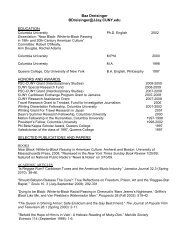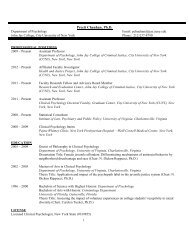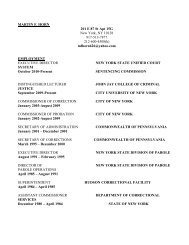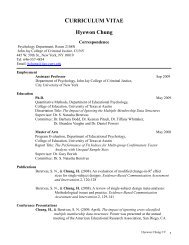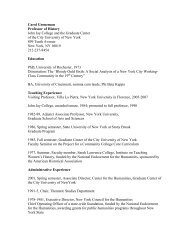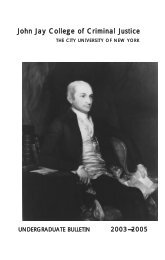Bulletin - John Jay College Of Criminal Justice - CUNY
Bulletin - John Jay College Of Criminal Justice - CUNY
Bulletin - John Jay College Of Criminal Justice - CUNY
You also want an ePaper? Increase the reach of your titles
YUMPU automatically turns print PDFs into web optimized ePapers that Google loves.
APPENDIX<br />
Accordingly, these procedures provide for alternative approaches<br />
depending on the severity of the sanction(s) being sought. If the<br />
instructor desires solely an “academic” sanction, that is, a grade<br />
reduction, less process is due than if a “disciplinary” sanction, such<br />
as suspension or expulsion, is sought.<br />
A faculty member who suspects that a student has committed a<br />
violation of the <strong>CUNY</strong> or the college Academic Integrity Policy shall<br />
review with the student the facts and circumstances of the suspected<br />
violation whenever possible. The decision whether to seek an<br />
academic sanction only, rather than a disciplinary sanction or both<br />
types of sanctions, will rest with the faculty member in the first<br />
instance, but the college retains the right to bring disciplinary charges<br />
against the student. Among the factors the college should consider in<br />
determining whether to seek a disciplinary sanction are whether the<br />
student has committed one or more prior violations of the Academic<br />
Integrity Policy and mitigating circumstances if any. It is strongly<br />
recommended that every instance of “suspected” violation should be<br />
reported to the Academic Integrity <strong>Of</strong>ficial on a form provided by the<br />
college as described in the third Recommendation for Promoting<br />
Academic Integrity, above. Among other things, this reporting will<br />
allow the college to determine whether it wishes to seek a<br />
disciplinary sanction even where the instructor may not wish to do so.<br />
B. Procedures In Cases Where The Instructor Seeks An<br />
Academic Sanction Only<br />
1. Student Accepts Guilt And Does Not Contest The Academic<br />
Sanction<br />
If the faculty member wishes to seek only an academic sanction (i.e.,<br />
a reduced grade 1 only), and the student does not contest either his/her<br />
guilt or the particular reduced grade the faculty member has chosen,<br />
then the student shall be given the reduced grade, unless the college<br />
decides to seek a disciplinary sanction, see Section I above and IV<br />
below. The reduced grade may apply to the particular assignment as<br />
to which the violation occurred or to the course grade, at the faculty<br />
member’s discretion.<br />
Footnote 1. A reduced grade can be an “F,” a “D-,” or another grade that is<br />
lower than the grade that would have been given but for the violation.<br />
2. Student Denies Guilt And/Or Contests The Academic Sanction<br />
If the student denies guilt or contests the particular grade awarded by<br />
the faculty member, then the matter shall be handled using the<br />
college’s grade appeals process, including departmental grading<br />
committees where applicable, or the Academic Integrity Committee.<br />
In either case, the process must, at a minimum, provide the student<br />
with an opportunity to be heard and to present evidence.<br />
C. Procedures In Cases Where A Disciplinary Sanction Is<br />
Sought<br />
If a faculty member suspects a violation and seeks a disciplinary<br />
sanction, the faculty member shall refer the matter to the college’s<br />
Academic Integrity <strong>Of</strong>ficial using the Faculty Report form, as<br />
described in the third Recommendation for Promoting Academic<br />
Integrity above, to be adjudicated by the college’s Faculty-Student<br />
Disciplinary Committee under Article 15 of the <strong>CUNY</strong> Bylaws. As<br />
provided for therein, the Faculty-Student Disciplinary Committee<br />
may, among other things, investigate, conciliate, or hear evidence on<br />
cases in which disciplinary charges are brought. 2 Under certain<br />
circumstances, college officials other than the Academic Integrity<br />
<strong>Of</strong>ficial may seek disciplinary sanctions following the procedures<br />
outlined above. For the reasons discussed in Item IV below, if a<br />
reduced grade is also at issue, then that grade should be held in<br />
abeyance, pending the Faculty-Student Disciplinary Committee’s<br />
action.<br />
Footnote 2. Typically, disciplinary sanctions would be sought in cases of the<br />
most egregious, or repeated, violations. For example, infraction in ways<br />
similar to criminal activity (such as forging a grade form; stealing an<br />
examination from a professor or a university office; or forging a transcript);<br />
having a substitute take an examination or taking an examination for someone<br />
else; sabotaging another student’s work through actions designed to prevent<br />
the student from successfully completing an assignment; dishonesty that<br />
affects a major or essential portion of work done to meet course requirements.<br />
[These examples have been taken from a list of violations compiled by<br />
Rutgers University.]<br />
312



